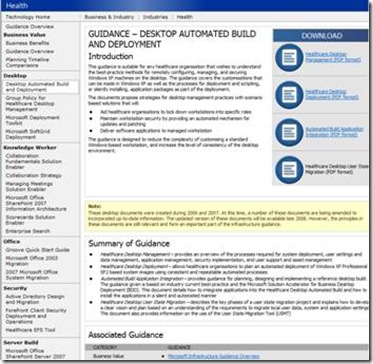Health Platform Optimization tool to Accelerate Deployment of Microsoft Technology
Ever since I can remember, when I used to face a complex problem, there was this universal wisdom that invited me to ‘go back to basics’ as a foundation for finding simple solution options to the problem at hand. This approach has worked for me much more often than not. The idea behind it is that the complexity of a problem is somehow related to the complexity of the initial assumptions and principles defining the solution domain.
If you have had exposure to our IT infrastructure maturity model (aka Infrastructure Optimization IO model), you may have guessed already where I am going with this. If you haven’t, I highly recommend that you visit here to see more details about what I am referring to before reading any further. There is an IT capability maturity assessment survey that you may want to check out while you’re there. There is also a great white paper entitled ‘Taking the Lead’ that you can access here on this topic.
For now, going back to basics means going back to a good understanding of the current IT capabilities you have in your organization using our Infrastructure Optimization assessment model and tools. This will allow you to define an optimized roadmap to help you reduce cost for deploying and supporting your IT infrastructure and platform, and at the same time improve IT alignment with the business demands.
If you are part of a healthcare organization, and some of your IT capabilities are in Basic stage today, I have double good news for you:
1. Moving these ‘Basic’ IT capabilities to Standardized stage presents a significant cost reduction opportunity for you. You will find more information about this at the links referenced above. The IO assessment survey will also provide you with information on cost reduction that is more closely applicable to your environment.
2. We have developed a set of tools (guidance, deployment kits, and solution accelerators) to help you move these IT capabilities to ‘Standardized’ stage. This is part of the Health Platform Optimization (HPO) guidance we are releasing for our health customers and partners as part of our Connected Health Platform (CHP). CHP is Microsoft technology offering and prescriptive architecture guidance aligned with the Connected Health Framework - Architecture & Design Blueprint for e-Health solutions built on the Microsoft platform.
HPO today has more than 40 guidance documents, tools and collaboration solution accelerators for healthcare organizations who want to move from Basic to Standardized to start reducing cost and more closer towards dynamic IT for greater agility and alignment with the business. HPO aims at helping healthcare organizations to maximize the benefits and reduce the cost of deploying and operating a Microsoft infrastructure and platform in a healthcare environment.
We will be releasing a roadmap providing you with updates on future releases of our guides, tools and solution accelerators covering a wider range of IT capabilities and IT maturity stages such as moving to Rationalized (or Advanced) or to Dynamic stage. You can access the HPO tool from here.
As always, we ask for your input to help us improve on the HPO tool. Your comments and feedback are greatly appreciated.
Following are some related links:
- IO for customers: https://www.microsoft.com/optimization
- IO for partners: https://www.microsoftio.com
- WW Health @ Microsoft: https://www.microsoft.com/health
- WW Health IT @ Microsoft: https://www.microsoft.com/healthit
teddy bachour
senior industry technology strategist - ww health



